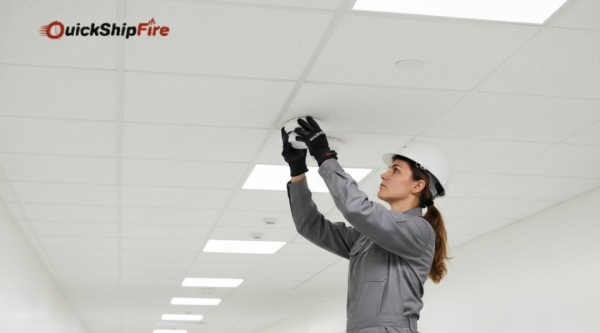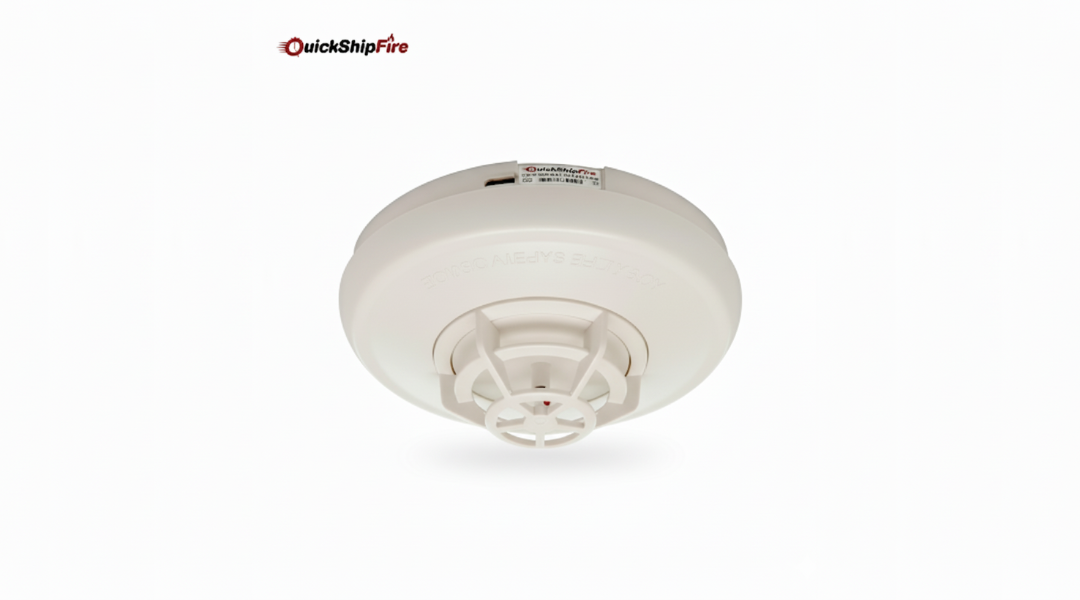When it comes to fire safety, people mostly think about smoke detectors first. But in many places, Heat Detectors are just as important, sometimes even more. A heat detector doesn’t sense smoke—it senses a rise in temperature or sudden heat, which is a clear sign that a fire might be starting. For both commercial buildings and residential houses, detectors add an extra layer of protection that you really shouldn’t skip.
In this blog, we’re going to talk in detail about what detectors are, how they work, where they are best used, and why they matter so much for keeping lives and property safe.
What is a Heat Detector?
A Heat Detector is a fire safety device designed to respond when there is an unusual rise in temperature. Unlike a smoke detector, it doesn’t get triggered by smoke or dust in the air. Instead, it reacts to heat levels crossing a set point, or in some cases, when temperature rises too quickly within a short time.
There are two main types:
- Fixed Temperature Heat Detector – goes off when the temperature reaches a preset level, like 135°F or 194°F.
- Rate-of-Rise Heat Detector – responds when temperature suddenly increases, even if it hasn’t reached the preset point yet.
These detectors are very reliable in places where smoke detectors might give false alarms, like kitchens, garages, warehouses, or mechanical rooms.
Why Choose Heat Detectors?
While best smoke detector is excellent for detecting early fire signs, smoke detectors can sometimes create problems. For example, in a busy kitchen or a parking garage, smoke, steam or exhaust can trigger false alarms again and again. That’s not just annoying—it also makes people ignore alarms after a while.
Heat detectors solve this problem because they don’t react to dust, steam or fumes. They only respond to actual dangerous heat conditions. That makes them very important in fire safety planning.
Heat Detector for Commercial Buildings
In commercial places like offices, warehouses, malls, hotels, or industrial setups, fire safety standards are very strict. Authorities demand reliable systems because a fire here can cause not only huge money loss but also risk to many lives.
Commercial spaces often use heat sensor systems in combination with smoke detectors and sprinklers. For example:
- In server rooms, where dust or cooling systems might confuse smoke detectors.
- In parking areas, where car exhaust makes smoke detectors go crazy.
- In kitchens of hotels or restaurants, where steam and cooking smoke are normal.
Here, heat detectors act as the silent guard. They may not be the first line of detection in every spot, but they are the most dependable when conditions are tricky.

Heat Detectors in Residential Spaces
Many homeowners still don’t know that installing a Heat Detector is sometimes better than putting a smoke detector. For instance, kitchens are not the right place for a smoke detector because it will keep giving false alarms while you cook. Same goes for garages, attics or laundry rooms.
In these areas, a heat detector is the right choice. It reacts only when temperature reaches dangerous levels, which means fewer false alarms and more peace of mind. Combined with smoke detectors in bedrooms, hallways and living areas, they create a complete safety network for the whole home.
How Heat-Detectors Work
The science behind them is simple but effective.
- Fixed Temperature type has a heat-sensitive element. When it reaches a certain temperature, the element changes shape or melts, closing the circuit and triggering the alarm.
- Rate-of-Rise type uses air expansion inside a chamber. If temperature rises too quickly, the pressure triggers the alarm.
Both are designed to be reliable and to reduce unnecessary alarms.
Advantages of Using Heat Detectors
- Less False Alarms – They don’t get triggered by smoke from cooking, dust, or steam.
- High Reliability – Perfect for places where conditions are rough or smoky.
- Strong Safety Backup – Works best in combination with smoke detectors.
- Durability – They usually last long with very little maintenance.
- Affordable – Cost-effective option to cover areas where smoke detectors fail.
Where to Install Heat-Detectors
- Kitchens (both homes and restaurants)
- Garages and parking structures
- Mechanical or boiler rooms
- Storage and warehouse areas
- Attics, basements, laundry areas
Important tip: should not replace smoke detectors in bedrooms, hallways or common living areas. Instead, they should be used to complement them.
Choosing the Right Heat-Detector
When you buy a Heat Detector, make sure you look at:
- The type: fixed temperature or rate-of-rise.
- The size of the area it will cover.
- Compatibility with your fire alarm control panel.
- Whether it’s for home, commercial or industrial use.
For large buildings, it’s always better to consult with a fire safety expert before finalizing.
Maintenance of Heat-Detectors
One of the reasons people prefer heat detectors is that they don’t require too much upkeep. Still, some steps are needed:
- Test them periodically as per manufacturer instructions.
- Keep them free from dust or paint.
- Replace them if damaged or after their rated lifespan.
A little care ensures they stay reliable for years.

FAQs About Heat Detectors
1. Are detectors better than smoke detectors?
Not exactly. They serve different purposes. detectors are better in places where smoke or dust would give false alarms, while smoke detectors are better at giving very early warning of fire. The best system is to use both together.
2. Where should I install detectors at home?
Ideal locations are kitchens, garages, laundry areas, attics or basements. Don’t put them in bedrooms or hallways—use smoke detectors there.
3. Do detectors connect to alarm panels?
Yes. Most modern detectors can be connected to a fire alarm control panel so that when they trigger, the whole alarm system is activated.
4. What temperature do they usually activate at?
Most fixed temperature detectors are set around 135°F (57°C) or higher. Industrial versions may go up to 194°F (90°C) or more, depending on environment.
5. Can I install a heat detector myself?
In homes, some models are simple enough to install yourself. But for commercial and industrial setups, it’s better to let certified professionals do the installation, since wrong placement can reduce effectiveness.
6. How often should detectors be tested?
Once or twice a year is usually fine for residential use. In commercial spaces, testing schedules might be more frequent due to fire code requirements.
7. Do they need to be replaced?
Yes. Like smoke detectors, they have a lifespan—generally 8 to 10 years. After that, replacement is recommended even if they look fine.
8. What’s the difference between fixed temperature and rate-of-rise detectors?
Fixed temperature only works when a set temperature is crossed. Rate-of-rise works when there’s a sudden fast increase in temperature, even if it’s below the fixed level. Both have their own uses.
Conclusion
Fire safety is never about just one device—it’s about building a system that covers every corner. Detectors may not get as much attention as smoke detectors, but in certain areas they are the real heroes. They don’t get fooled by steam or dust, they don’t shout false alarms, and they act right when heat signals danger.
For commercial setups, residential homes, and even industrial facilities, detectors are an essential piece of the fire protection puzzle. Install them where they fit best, pair them with smoke detectors in the right places, and you get a complete safety net that protects both people and property.

